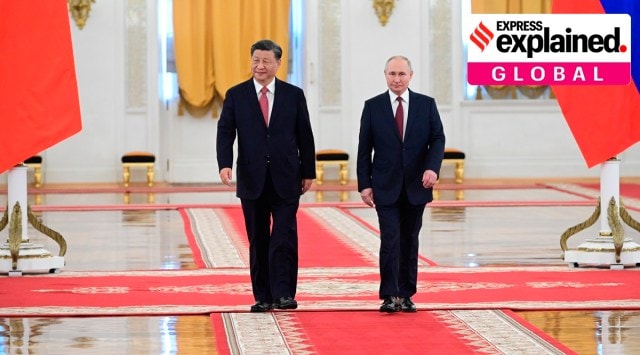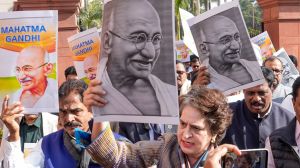Power play in Moscow: What China hopes to gain from Xi’s meeting with Putin
Xi Jinping sees in Vladimir Putin an ally in the opposition to Western liberal ideas and a US-led global order. While the Chinese are no doubt calculating the costs of Russia’s actions to themselves, Beijing is unlikely to want a quick end to the war in Ukraine. Here's why.
 Russian President Vladimir Putin and Chinese President Xi Jinping attend an official welcome ceremony at The Grand Kremlin Palace, in Moscow, Russia, Tuesday, March 21. (Kremlin Pool Photo via AP)
Russian President Vladimir Putin and Chinese President Xi Jinping attend an official welcome ceremony at The Grand Kremlin Palace, in Moscow, Russia, Tuesday, March 21. (Kremlin Pool Photo via AP)China’s President Xi Jinping is on an enormously significant three-day visit to Russia, having landed in Moscow days after the International Criminal Court issued warrants for the arrest of President Vladimir Putin for alleged war crimes, and as bloody fighting continued in eastern Ukraine 13 months after the Russian invasion began.
The two leaders spoke for more than four hours on Monday, discussing a Chinese proposal for a de-escalation and eventual ceasefire, and warmly praised each other as “dear friend”, Reuters reported, quoting Russian media.
Meanwhile, Japan’s Prime Minister Fumio Kishida flew to Kyiv from New Delhi on Tuesday with a message of solidarity and support for President Volodymyr Zelenskyy. And United States Secretary of State Antony Blinken said Xi’s visit to Moscow was an indication that “China feels no responsibility to hold the Kremlin accountable for the atrocities committed in Ukraine”.
What does Xi hope to achieve by this visit to meet Putin?
The China-Russia relationship matters to Beijing for several reasons.
One, from the point of view of security, it is imperative for Beijing to maintain both outreach and cordial relations with Moscow.
It must be remembered that the former Soviet Union and China had a history of both cooperation and violent clashes during the Cold War. Some objective conditions have not changed despite the fall of the Soviet Union and its successor’s considerably less significant global political and economic influence — Russia is still China’s largest neighbour, a major source of military technology, and continues to exercise influence in the former Soviet states that border China’s troubled west. Additionally, Russia is now a major source of hydrocarbon energy as well as a market for China’s manufacturing and technology.
Just as importantly, Xi Jinping sees in Vladimir Putin an ally in the opposition to Western liberal ideas and a US-led global order.
The Chinese under Xi meant every word when they declared a partnership with “no limits” during Putin’s visit to Beijing in early February 2022 on the eve of his invasion of Ukraine. To the Chinese, Western sanctions against Russia are an example of what a new Chinese document on their Global Security Initiative calls “abusing unilateral sanctions and long-arm jurisdiction”.
Meanwhile, the Chinese call for the International Criminal Court (ICC) “to take an objective and just position, respect the jurisdictional immunity of a head of state under international law, prudently exercise its mandate in accordance with the law, interpret and apply international law in good faith”, might actually find several takers across the world — no matter the violation of international law that the Ukraine invasion represents.
The same Chinese statement by the Chinese Foreign Ministry on March 20 also declared, “China will uphold an objective and fair position on the Ukraine crisis and play a constructive role in promoting talks for peace,” essentially negating the narrative of an unjust war against Ukraine and portraying Xi’s visit to Moscow as any regular bilateral state visit.
While the Chinese are no doubt constantly calculating the costs of Russia’s actions to themselves — they cannot have been too pleased with Putin’s visit to occupied Mariupol late on Saturday, for example — Xi sees value in showing the non-Western world that there is an alternative to American power and ideas of how the world should be run.
Does China want the war to end? Does it have influence on Putin enough to get him to stop?
Beijing is unlikely to want an end to the Russian war in Ukraine for several reasons.
First, being tied down in Ukraine has the effect of weakening Russia militarily, economically, and politically. This is a vacuum that China can step into, especially in Eurasia — in September last year, for example, China offered security guarantees to Kazakhstan during Xi’s visit there, and made Belarus its second “all-weather strategic partner” after Pakistan.
Second, a prolonged conflict in Ukraine means that the West’s, and in particular the United States’, attention and resources are diverted — and this the Chinese see as a good thing. From Beijing’s point of view, it weakens the focus on and reduces the resources for any potential Western intervention on China’s eastern seaboard, particularly in the scenario of a crisis over Taiwan.
Third, a continuing crisis in Ukraine offers opportunities for international messaging about the relative rise in Chinese power vis-à-vis both the Russians and Americans. Clearly, Russia’s regional and global stature has taken a hit from what it has done and what it is unable to do — that is, to prosecute a quick end to the conflict.
Meanwhile, just as China’s role in helping Iran and Saudi Arabia restore diplomatic ties was intended to showcase Beijing’s rising influence and the decline of the US in the Middle Eastern region, the inability of the Ukrainians to expel the Russian invaders despite Western support can be used to send a signal in Europe.
There is, therefore, little reason for Xi to try and persuade Putin to stop the war.
If anything, China’s political support at forums such as the United Nations and elsewhere has been crucial to Russia building a case for the legitimacy of the war. We might even see over time indirect Chinese military support to Russia. The agreement between Belarus and China earlier this year has sections on industrial production, joint R&D and defence cooperation — which could well allow for potential weapons production and transhipment to Russia.
Are the US and China, too, in talks over the war?
There is no doubt that Washington and Beijing have a conversation ongoing about the conflict in Ukraine, but it is unlikely that they can come to any sort of meeting ground in the foreseeable future.
The two nations have fundamentally different interests on this and other issues, and more often than not, these are opposing interests. These differences are ideological and deep-rooted, and the recent American shooting down of a Chinese surveillance balloon in US airspace suggests that tensions in the US-China relationship are only set to grow.
Even if their interests were to align temporarily, Xi has too close a relationship with Putin — and sees greater value in a Russian bulwark against the West — to try and actively promote Washington’s brief. It is also not clear what the Americans could offer China in return.
How does the war affect China?
There is no doubt that the war brings costs to China — not just economic ones but political ones, too, especially from the major Western nations that are also big markets for Chinese manufacturing and sources for high technology.
But these are costs that the Chinese economy appears large enough to bear, especially when it is able to procure oil at deep discounts from Russia, and has had its own version of technological self-reliance programmes underway for decades. China is also able to use its economic influence to carry out trade in its own currency with Russia and other sanctioned regimes — Iran, for example.
But the impact of the Russia-Ukraine conflict on China is not just external and economic but also internal.
The conflict confirms Xi’s claims in recent times in several important domestic documents and speeches that China “is facing global changes of a magnitude not seen in a century”. Calling attention to a challenging external environment is Xi’s way of reminding the Chinese people of the perils of “[v]arious ‘black swan’ and ‘gray rhino’ events” and the necessity of supporting the ruling Communist Party and Xi himself to help them deal with these challenges.
An unstable external environment and its economic consequences can also be used to justify both China’s current economic difficulties in the wake of the pandemic as well as Xi’s continuing hold over the reins of power as being essential for national stability and recovery.
Jabin T Jacob is Associate Professor, Department of International Relations and Governance Studies, and Director, Centre for Himalayan Studies, Shiv Nadar Institution of Eminence, Delhi-NCR.
- 01
- 02
- 03
- 04
- 05






































